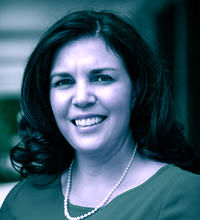The Institute Continues Focus on Student Well-Being and Happiness
 In a packed house, members of the Duke community came together to hear Margarita Mooney (Princeton) talk about why personalism, or being human in the modern world, has value in education. Farr Curlin, Director of the Arete Initiative at Kenan, introduced Mooney as being well-aligned with this series of speakers who explore how best to live a good and worthy life in the public sphere. In specific reference, Arete guest speaker Christine Wampole (Princeton) focused her discussion last semester on universities as laboratories for innovation and experimentation to nurture their students’ well-being and character.
In a packed house, members of the Duke community came together to hear Margarita Mooney (Princeton) talk about why personalism, or being human in the modern world, has value in education. Farr Curlin, Director of the Arete Initiative at Kenan, introduced Mooney as being well-aligned with this series of speakers who explore how best to live a good and worthy life in the public sphere. In specific reference, Arete guest speaker Christine Wampole (Princeton) focused her discussion last semester on universities as laboratories for innovation and experimentation to nurture their students’ well-being and character.
Criticizing the “burnout culture” she described as rampant in the American university, Mooney blamed the misplaced focus on education as a credentialing opportunity, rather than an opportunity to grapple with moral virtues to discover each individual’s “inner vitality.” This focus on grades and competitive metrics created profound unhappiness among her students who complained to Mooney of the huge discrepancy between the college experience they hoped for and the one they actually received. This disillusionment, Mooney argued, leads to burnout and a rise in incivility, conflict and mental health issues across America’s campuses.
In response to this crisis, Mooney founded the Scala Foundation (a reference to the Benedictine rule that in order to ascend to God’s presence, one must be prepared to step down in humility) to support her students in forming authentic friendships and character building. Drawing on the work of French philosopher, Jacques Maritain, and German phenomenologist, Max Scheler, Mooney’s project critiques the modern university’s pedagogical approach as one designed to accommodate the pragmatic instincts of many students. Since these impulses are often driven by base instincts such as power, sex, or nourishment—all at the expense students’ humanity.
Throughout her talk, Mooney repeatedly emphasized that while the university does many things well, it cannot and should not try to do all things well. Misplaced efforts to shape students’ will or character may deform rather than construct if pressed too much. In contrast, the Scala method emphasizes an approach based on human freedom by means of Socratic and experiential techniques to explore concepts of hospitality, charity and authentic friendship, serving to bridge the alienation and conflict often encountered on campus. Furthermore, it guides students towards practical applications that improve their well-being and that of others around them. The Institute is trying to do just that with the new What Now: The Duke Guide to Happiness, Purpose & Well-Being in partnership with Trinity College.
Ultimately, Mooney warned her audience that if students (and professors) are not taught to embrace the freedom and reason intrinsic to being human, then all that remains are those base desires and challenges to experiencing pleasure. We can help—and must—students integrate what they learn in the classroom to the big and small daily practices that make up a fulfilling human life. Mooney noted an alumni’s praise and endorsement for these concepts for forcing him to “reread and restructure his life in light of intellectual formation.”
This event was co-sponsored by Center for Christianity and Scholarship.
The What Now network of first-year seminars creates a community organized around (really!) big questions and building the skills to not only begin to answer them but live better in the process. Through the network, you’ll take a seminar led by engaged faculty. You’ll also regularly connect with students and faculty in related courses. By taking one course, you’ll have access to a wider array of ideas and students than is usually possible in a single seminar.
